浙江省衢州市仲尼中学高一英语《Period 2 ReadingⅠ》教案
浙江省衢州市仲尼中学高一英语人教版《音标》复习教案:Period 2 英语单词发音规则

高一英语教案(Period1--5)Period2 英语单词发音规则高一英语备课组教材分析:在前一课时学生已初步接触了48个音标,在这一基础上集中呈现所有音标,让学生感知48个音标的全貌,熟练认读48个音标,了解音标的分类,了解元音与辅音的发音特点并能初步拼读单音节的“音标词”学情分析:学生在前一课时已经能够认识所有音标,就是说在一开始就尝到学好音标的甜头,要尽快过渡到拼音能力的培养,要让学生对音标的认识尽快从感性上升到理性,再付诸实践,在实践中学习。
只有这样才能提高学生拼读的熟练程度。
教学目标:进一步分散巩固前面所学的字母、音素和音标,确实形成熟练的拼读能力,并进一步学习和掌握单音部分的其它学习。
教学重点:了解字母、音素、音标三者之间的内在联系,明确各自在拼读单词中的作用,完成48个音素、音标及其相应字母、字母组合的教学,使学生初步过发音、拼读开口关。
教学难点:部分音标组合比较难读,且有一些不符合读音规则的单词教学流程:英语单词发音规则1 元音:1) [i:] 字母组合:ee ea e iethree tree green sheep meet beef see seek(ee)eat tea meat leave lead teacher team mean speak clean please(ea)he she me(e)piece receive ceiling (ie,ei)2) [i] 发音字母i y esit picture it is list six mix fix fit pig big build missmyth many twenty happy dictionarydefect decide delicious3) 发音字母abag hand and ant happy hat map mad bad black back glad flag shall man4) [e] 字母组合ea e ahead bread pleasureelephant electric remember sell shell lesson better bed desk hotel yesmany any5) [ε:] 字母组合ir ur ear er orgirl shirt skirt thirty thirteen third birdturn burn murder nurse turtle Thursday burgerlearn earn earth heardterm her nerd servework worm work world6) [ε] 字母组合er or ou ar o a e uteacher leader remember player speaker farmer powderdoctor actor mayor author tractordelicious graciouspleasure familiarcollar dollar together tomorrow today shallop lesson Washington control polite around account agoelephant manta banana Canada Japan china men listenfamulus Saturday7) [a:] 字母组合ar acar farm card arm gardenfast class last glass plant aunt calm8)[ʌ]发音字母u o ou ooup supper lunch fun gun hunt cup buscome mother dose brother love abovetrouble rough flourishblood flood9) [ɔ:]字母组合al or au our ar awsmall wall talk tall hall ball call walkshort more lord horse for forty sport door floor storeauthor caught autumnfour mourn court boughtwarm quarrel quarterdraw saw flaw10) [ɔ]发音字母o ahot lost lot fox box mop hop loss collar notwant wash11) [u:] 字母组合oo o ufood moon room gloom broom doom goose toothshoe do twotrue truth blue full12) [u] 字母组合oo ou ulook good foot bookshould couldput full bull pull pushwoman wolf13) [ei] 发音字母a ay ea ai eyname cake late gate plane Aprilplay say may waygreat breakrain paint plainthey grey14) [ai] 发音字母i ybike fine find die nine light night highmy try fly eye15) [au] 字母组合ou owhouse out flour ground account count sound loud around mouse flower down now cow how town16) [εu] 发音字母o ow oahome cold go no phone host ghostknow low below grow blow show flowboat coat goal17) [ɔi] 字母组合oy oiboy toy joyoil soil voice choice18) [iε] 字母组合eerbeer deer ear idea near here fierce19) [eε ] 字母组合ear airpear bear chair air fair care there where20) [uε] hour tour poor flower shower2 容易混淆的元音[æ] [e]bad bed hand head man men land lend pan pen sad said[i:] [ei]real rail greet great mean main read raid[e] [ai]bet bite red write said side head hide[au] [ɔrn]house horse loud lord south sauce cloud clause now nor count corn [au] [ɔn ]found fond down done gown gone town ton3辅音1) [p] pen pear play pig pour pull push2) [b] book big boot bike bread break3) [t] tree two ten ton town twenty city4) [d] door dull desk dose do dog dictionary5) [k] king kite key look cook book kitchen sky (发音字母k)card cat cream correct climb come account accept (发音字母c) fox box oxygen x-ray (发音字母x)school schedule schema (字母组合ch)6) [g] girl good goal goat grade long language7) [m] man make moon morning move come comb8) [n] pen ten nine fine night noon moon clean9) [ŋ] uncle bank English think thank junksing king morning evening10) [l] long land lend lord fly flag blackworld cold could goal soul11) [r] read red right run room write12) [f] five fly fine flag frog fog roof knife life wife (字母f)cough laugh rough(字母gh)physic photo phone (ph)13) [v] very evening even every voice vest( 字母v)of (字母f)14) [s] six sit student same seat kiss miss case scarf (发音字母s) license city cease cedar ceiling celebrate (发音字母c)licence piece juice science lance space ace (字母组合ce)15) [z] zoo zebra zero zap (z)close nose hose suppose pause those whose (se)16) [θ] think thank three thirty tooth mouth17) [ð] that this those these though18) [ʃ]sheep shoulder ship shoe she brush wash (sh)nation attention stationsocial specialsure19) [ʒ] pleasure20) [h] hot hop home house horse how who21) [w] when what where window wind wood22) [j] yes year yell you your yolk yellow23) [tʃ] child chicken china chair lunch ouch teach (字母组合ch)catch watch match (字母组合tch)24) [dʒ] age language cabbage vegetable stage bridgejoy enjoy join July June junk25) [tr] tree country try treat track trunk26) [dr] dry dream drop drive drink27) [ts] students boots boats goats nuts28) [dz] goods woods moods hoods4容易混淆的辅音[v] [w]vest west vet wet vine wine very well[s] [θ]sink think mass math miss myth sort sought[z] [ð]close cloth breeze breathe[n] [ŋ]thin thing sin sing ran rang ban bang win wing板书设计:1 元音:1) [i:] 字母组合:ee ea e ie three tree green see (ee) eat tea meat teacher clean please(ea)he she me(e)piece receive (ie,ei)2) [i] 发音字母i y esit picture it is list sixmany twenty happydecide delicious3) [æ]发音字母aand ant happy hat map4) [e] 字母组合ea e a head bread pleasure elephant remember yes many any5)[ε:]字母组合ir ur ear er or girl shirt skirt thirty bird turn burn Thursdaylearn earn earthterm herwork world6) [ε] 字母组合er or ou ar o a e uteacher leader remember doctor actor author delicious gracious pleasure familiartogether tomorrow today agobanana Canada Japan china famulus Saturday7) [a:] 字母组合ar acar farm card arm garden fast class last glass plant aunt calm8)[ʌ]发音字母u o ou ooup lunch fun gun cup buscome mother dose loveabovetrouble roughblood flood9) [ɔ:]字母组合al or auour ar awsmall wall talk tall call walkshort horse for door floorauthor autumnfour court boughtwarm quarrel quarterdraw saw flaw10) [ɔ]发音字母o ahot lost lot box loss notwant wash11) [u:] 字母组合oo o ufood moon room toothshoe do twotrue truth blue full12) [u] 字母组合oo ou ulook good foot bookshould couldput full bull pull pushwoman wolf13)[ei]发音字母a ay ea ai eyname cake late planeplay say may waygreat breakrain paint plainthey grey14) [ai] 发音字母i ybike fine find die lightmy try fly eye15) [au] 字母组合ou owhouse out count soundflower down now how town16) [εu] 发音字母o ow oahome cold go no phoneknow low grow showboat coat goal17) [ɔi] 字母组合oy oiboy toy joyoil soil voice choice18) [iε] 字母组合eerdeer ear idea near here19) [eε ] 字母组合ear airpear bearr care there where20) [uε] hour tour poor2 容易混淆的元音[æ] [e]bad bed hand head man men land lend pan pen sad said[i:] [ei]real rail greet great mean main read raid[e] [ai]bet bite red write said side head hide[au] [ɔrn]house horse loud lord south sauce cloud clause now nor count corn [au] [ʌn ]found fond down done gown gone town ton3辅音1) [p] pen pear play pig2) [b] book big boot bike3) [t] tree two ten ton4) [d] door desk do5) [k] king kite look book (发音字母k) card cat climb come (发音字母c) fox box x-ray (发音字母x) school schedule (字母组合ch)6) [g] girl good goal goat7) [m] man make moon8) [n] pen ten nine noon9) [ŋ] uncle bank Englishsing king morning evening10) [l] long land lend blackworld cold could goal soul11) [r] read red right run12) [f] five fly fine flag (字母f)cough laugh rough(字母gh)physic photo phone (ph)13) [v] very evening even every ( 字母v) of (字母f)14) [s] six sit student same (发音字母s) license city cease (发音字母c)piece juice science space (字母组合ce) 15) [z] zoo zebra zero zap (z)nose hose those whose (se)16) [θ] think thank three17) [ð] that this those these18) [ʃ]sheep shoe she wash (sh)nation attention stationsocial specialsure19) [ʒ] pleasure20) [h] hot home how who21) [w] when what where wind22) [j] yes year you your23) [tʃ] child china teach (字母组合ch)catch watch match (字母组合tch) 24) [dʒ] age language vegetableenjoy join July June25) [tr] tree country try treat26) [dr] dry dream drive drink27) [ts] students boats goats28) [dz] goods woods4容易混淆的辅音[v] [w]vest west vet wet vine wine very well[s] [θ]sink think mass math miss myth sort sought[z] [ð]close cloth breeze breathe[n] [ŋ]thin thing sin sing ran rang ban bang win wing作业设计:A级每个学生任意准备20个生词(单词须8字母以上),两个同学互相拼读,指正发音及拼读的准确性读完20个生词加音标每个抄写10次,要求书写认真规范B级每个学生任意准备20个生词(单词须6字母以上),两个同学互相拼读,指正发音及拼读的准确性读完20个生词每个抄写10次,要求书写认真规范C级部分听写有困难的学生继续记忆音标听写过关的学生可做A,B类作业。
人教版高中英语必修2衢州市仲尼中学Unit 1 Cultural relics教案课时2
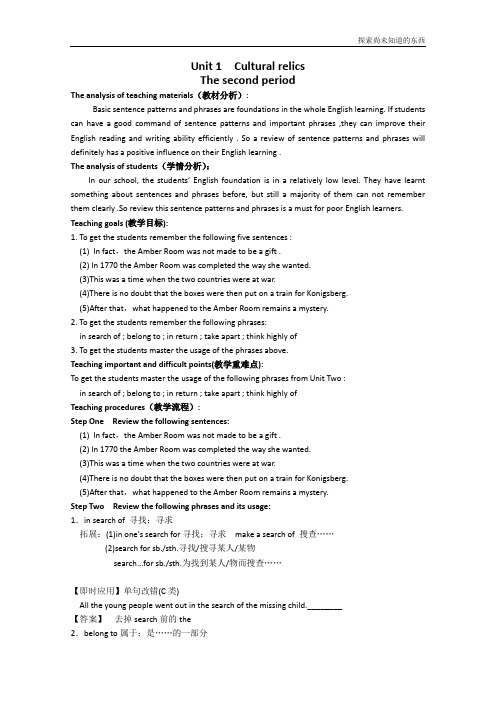
Unit 1 Cultural relicsThe second periodThe analysis of teaching materials(教材分析):Basic sentence patterns and phrases are foundations in the whole English learning. If students can have a good command of sentence patterns and important phrases ,they can improve their English reading and writing ability efficiently . So a review of sentence patterns and phrases will definitely has a positive influence on their English learning .The analysis of students(学情分析):In our school, the students’English foundation is in a relatively low level. They have learnt something about sentences and phrases before, but still a majority of them can not remember them clearly .So review this sentence patterns and phrases is a must for poor English learners. Teaching goals (教学目标):1. To get the students remember the following five sentences :(1)In fact,the Amber Room was not made to be a gift .(2)In 1770 the Amber Room was completed the way she wanted.(3)This was a time when the two countries were at war.(4)There is no doubt that the boxes were then put on a train for Konigsberg.(5)After that,what happened to the Amber Room remains a mystery.2. To get the students remember the following phrases:in search of ; belong to ; in return ; take apart ; think highly of3. To get the students master the usage of the phrases above.Teaching important and difficult points(教学重难点):To get the students master the usage of the following phrases from Unit Two :in search of ; belong to ; in return ; take apart ; think highly ofTeaching procedures(教学流程):Step One Review the following sentences:(1)In fact,the Amber Room was not made to be a gift .(2)In 1770 the Amber Room was completed the way she wanted.(3)This was a time when the two countries were at war.(4)There is no doubt that the boxes were then put on a train for Konigsberg.(5)After that,what happened to the Amber Room remains a mystery.Step Two Review the following phrases and its usage:1.in search of 寻找;寻求拓展:(1)in one's search for寻找;寻求make a search of 搜查……(2)search for sb./sth.寻找/搜寻某人/某物search...for sb./sth.为找到某人/物而搜查……【即时应用】单句改错(C类)All the young people went out in the search of the missing child.________【答案】去掉search前的the2.belong to属于;是……的一部分belongings所有物;财产注:belong to无被动式和进行时。
M4U2READING1高一英语学科学教案
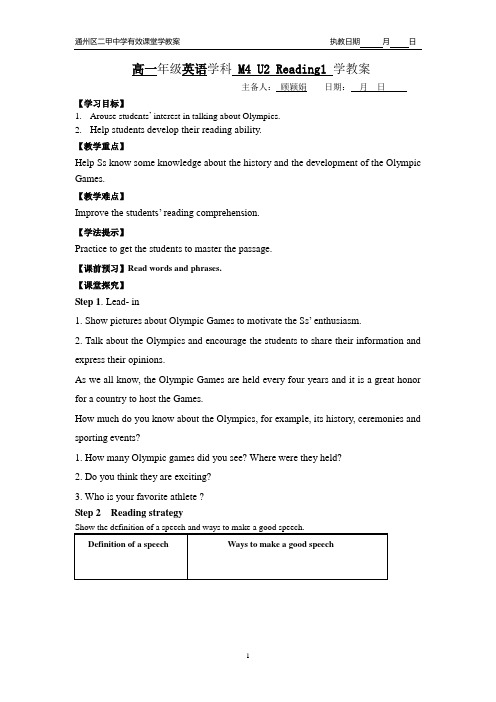
【学习目标】1.Arouse students’ interest in talking about Olympics.2.Help students develop their reading ability.【教学重点】Help Ss know some knowledge about the history and the development of the Olympic Games.【教学难点】Improve the students’ reading comprehension.【学法提示】Practice to get the students to master the passage.【课前预习】Read words and phrases.【课堂探究】Step 1. Lead- in1. Show pictures about Olympic Games to motivate the Ss’ enthusiasm.2. Talk about the Olympics and encourage the students to share their information and express their opinions.As we all know, the Olympic Games are held every four years and it is a great honor for a country to host the Games.How much do you know about the Olympics, for example, its history, ceremonies and sporting events?1. How many Olympic games did you see? Where were they held?2. Do you think they are exciting?3. Who is your favorite athlete ?Step 2 Reading strategyPart AStep 4 Structure readingCheck students understanding of the structure of the passage. Part 1Part 2Part 3Part 4Step 5 Detailed readingPart C2Step 6 DiscussionWhat fine qualities do you think these athletes have in common?【课堂巩固】Part C1, D,E【课后作业】《课课练》P39【教后反思】。
人教版高中英语必修3衢州市仲尼中学Unit 2Language points 1教案
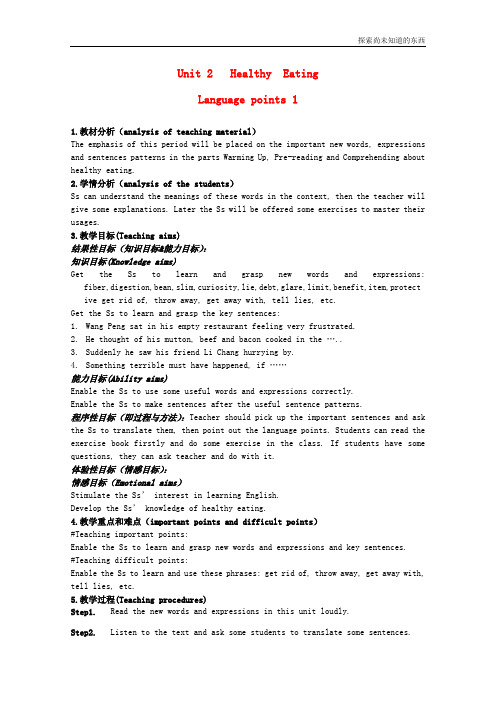
Unit 2 Healthy EatingLanguage points 11.教材分析(analysis of teaching material)The emphasis of this period will be placed on the important new words, expressions and sentences patterns in the parts Warming Up, Pre-reading and Comprehending about healthy eating.2.学情分析(analysis of the students)Ss can understand the meanings of these words in the context, then the teacher will give some explanations. Later the Ss will be offered some exercises to master their usages.3.教学目标(Teaching aims)结果性目标(知识目标&能力目标):知识目标(Knowledge aims)Get the Ss to learn and grasp new words and expressions: fiber,digestion,bean,slim,curiosity,lie,debt,glare,limit,benefit,item,protect ive get rid of, throw away, get away with, tell lies, etc.Get the Ss to learn and grasp the key sentences:1.Wang Peng sat in his empty restaurant feeling very frustrated.2.He thought of his mutton, beef and bacon cooked in the …..3.Suddenly he saw his friend Li Chang hurrying by.4.Something terrible must have happened, if ……能力目标(Ability aims)Enable the Ss to use some useful words and expressions correctly.Enable the Ss to make sentences after the useful sentence patterns.程序性目标(即过程与方法):Teacher should pick up the important sentences and ask the Ss to translate them, then point out the language points. Students can read the exercise book firstly and do some exercise in the class. If students have some questions, they can ask teacher and do with it.体验性目标(情感目标):情感目标(Emotional aims)Stimulate the Ss’ interest in learning English.Develop the Ss’ knowledge of healthy eating.4.教学重点和难点(important points and difficult points)#Teaching important points:Enable the Ss to learn and grasp new words and expressions and key sentences.#Teaching difficult points:Enable the Ss to learn and use these phrases: get rid of, throw away, get away with, tell lies, etc.5.教学过程(Teaching procedures)Step1. Read the new words and expressions in this unit loudly.Step2. Listen to the text and ask some students to translate some sentences.Step3. Learn some language points.1.diet n.日常饮食 / v. 节食put sb. on a diet 给某人规定饮食词语辨析:diet & foodDiet:惯常的或规定的食物,指维持健康的定量或定质的食物。
人教版高中英语必修2衢州市仲尼中学Unit 2 The Olympic Games教案课时1
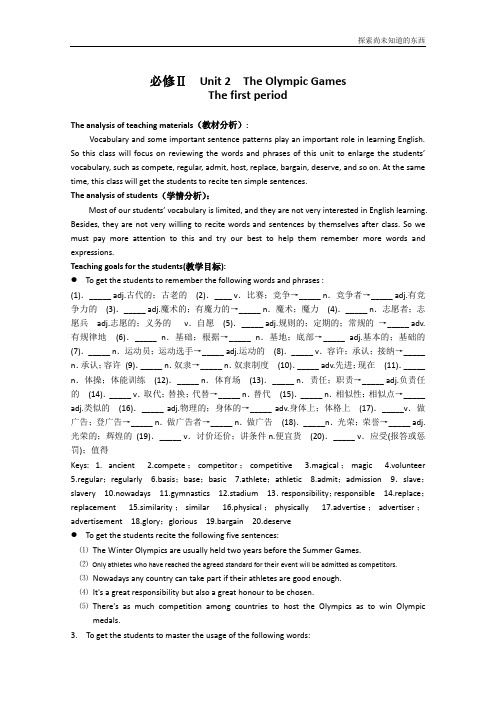
必修ⅡUnit 2The Olympic GamesThe first periodThe analysis of teaching materials(教材分析):Vocabulary and some important sentence patterns play an important role in learning English. So this class will focus on reviewing the words and phrases of this unit to enlarge the students’vocabulary, such as compete, regular, admit, host, replace, bargain, deserve, and so on. At the same time, this class will get the students to recite ten simple sentences.The analysis of students(学情分析):Most of our students’ vocabulary is limited, and they are not very interested in English learning. Besides, they are not very willing to recite words and sentences by themselves after class. So we must pay more attention to this and try our best to help them remember more words and expressions.Teaching goals for the students(教学目标):●To get the students to remember the following words and phrases :(1)._____ adj.古代的;古老的(2).____ v.比赛;竞争→_____ n.竞争者→_____ adj.有竞争力的(3)._____ adj.魔术的;有魔力的→_____ n.魔术;魔力(4)._____ n.志愿者;志愿兵adj.志愿的;义务的v.自愿(5)._____ adj.规则的;定期的;常规的→_____ adv.有规律地(6)._____ n.基础;根据→_____ n.基地;底部→_____ adj.基本的;基础的(7)._____ n.运动员;运动选手→_____ adj.运动的(8)._____ v.容许;承认;接纳→_____ n.承认;容许(9)._____ n.奴隶→_____ n.奴隶制度(10)._____ adv.先进;现在(11)._____ n.体操;体能训练(12)._____ n.体育场(13)._____ n.责任;职责→_____ adj.负责任的(14)._____ v.取代;替换;代替→_____ n.替代(15)._____ n.相似性;相似点→_____ adj.类似的(16)._____ adj.物理的;身体的→_____ adv.身体上;体格上(17)._____v.做广告;登广告→_____ n.做广告者→_____ n.做广告(18)._____n.光荣;荣誉→_____ adj.光荣的;辉煌的(19)._____ v.讨价还价;讲条件n.便宜货(20)._____ v.应受(报答或惩罚);值得Keys: 1. ancient pete;competitor;competitive 3.magical;magic 4.volunteer 5.regular;regularly 6.basis;base;basic7.athlete;athletic8.admit;admission 9.slave;slavery10.nowadays11.gymnastics12.stadium 13.responsibility;responsible14.replace;replacement15.similarity;similar16.physical;physically17.advertise;advertiser;advertisement18.glory;glorious19.bargain20.deserve●To get the students recite the following five sentences:⑴The Winter Olympics are usually held two years before the Summer Games.⑵Only athletes who have reached the agreed standard for their event will be admitted as competitors.⑶Nowadays any country can take part if their athletes are good enough.⑷It's a great responsibility but also a great honour to be chosen.⑸There's as much competition among countries to host the Olympics as to win Olympicmedals.3. To get the students to master the usage of the following words:compete, regular, admit, host, replace, bargain, deserveTeaching important and difficult points(教学重难点):To get the students to master the usage of the following words: compete, regular, admit, host, replace, bargain, deserveTeaching procedures(教学流程):Step One: Ask the students to read and recite the following ten sentences on Page One:1.The mid-term exams will be taken two months before the final ones.2. Only soldiers are allowed to enter the building.3. You can make fewer mistakes if you are careful enough.4. He is a good teacher but also a good father.5. It is as interesting to learn English as to learn Chinese.Step Two: Go over the following words and phrases:compete, regular, admit, host, replace, bargain, deserveFirst lead the reading these words and phrases and then get the students do the following exercises and check answers with them:一、选词填空(B类)1.In ________times,only men athletes could take part in the games.2.Altogether 3,000 competitors competed in the recent________.3.These out-of-date mottoes must be ________ with new ones,in my opinion.4.They stared at the strange circle in the wall,not knowing what it ________.5.Who do you think will ________ our discussion?Keys: 1.ancient petition 3.replaced 4.stood for 5.take part in二、补全句子(C类)1.After the film,the students walked out of the cinema ________________(一个接一个).2.The students ________________(和) their teachers are wishing for a long holiday.3.Over 200 graduates will ________________(竞争) the position this time.4.It's said that one middle-aged woman ________________(负责) the coming driving test. 5.My sister is not ____________(足够大) to join the army.Keys: 1.one after another 2.as well as pete for 4.is in charge of 5.old enough Step Three: Language Points:1.compete v.竞争;比赛(1) compete in 参加……比赛compete with/against... 与……竞赛(竞争)compete for... 为……角逐(竞争)(2) compete to do sth.竞争做某事运用上述词汇或短语完成下列情景(B类)As the youngest (1)________,John had to compete (2)________the writing contest (3)________30 other top students (4)________the annual award of writing. So he must be very competitive so that he could win in the (5)________.【答案】(1)competitor(2)in(3)with/against (4)for(5)competition2.regular adj.规则的;定期的;常规的(1) on a regular basis 定期;经常have no regular education 没有接受正规教育a regular customer/meeting 老顾客/例会keep regular hours 按时;有规律(2) be regularly invited to do sth.经常被邀请做某事Once the weather is ________,the ________ flight to Hong Kong will take off.(B类)A.normal;normal B.regular;regular C.normal;regular D.regular;normal 【解析】C 表示“天气正常”使用normal;指“固定的航班”应使用regular。
人教版高中英语必修3衢州市仲尼中学教案Healthy eatingPeriod 2 Reading 新
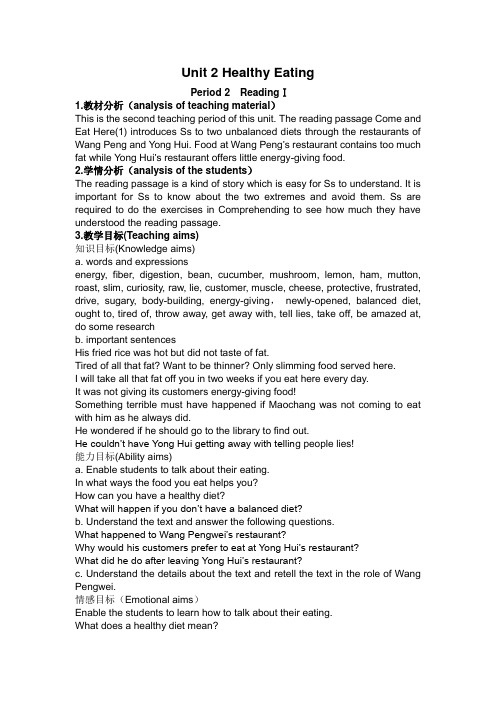
Unit 2 Healthy EatingPeriod 2 ReadingⅠ1.教材分析(analysis of teaching material)This is the second teaching period of this unit. The reading passage Come and Eat Here(1) introduces Ss to two unbalanced diets through the restaurants of Wang Peng and Yong Hui. Food at Wang Peng’s restaurant contains too much fat while Yong Hui’s restaurant offers little energy-giving food.2.学情分析(analysis of the students)The reading passage is a kind of story which is easy for Ss to understand. It is important for Ss to know about the two extremes and avoid them. Ss are required to do the exercises in Comprehending to see how much they have understood the reading passage.3.教学目标(Teaching aims)知识目标(Knowledge aims)a. words and expressionsenergy, fiber, digestion, bean, cucumber, mushroom, lemon, ham, mutton, roast, slim, curiosity, raw, lie, customer, muscle, cheese, protective, frustrated, drive, sugary, body-building, energy-giving,newly-opened, balanced diet, ought to, tired of, throw away, get away with, tell lies, take off, be amazed at, do some researchb. important sentencesHis fried rice was hot but did not taste of fat.Tired of all that fat? Want to be thinner? Only slimming food served here.I will take all that fat off you in two weeks if you eat here every day.It was not giving its customers energy-giving food!Something terrible must have happened if Maochang was not coming to eat with him as he always did.He wondered if he should go to the library to find out.He couldn’t have Yong Hui getting away with tellin g people lies!能力目标(Ability aims)a. Enable students to talk about their eating.In what ways the food you eat helps you?How can you have a healthy diet?What will happen if you don’t have a balanced diet?b. Understand the text and answer the following questions.What happened to Wang Pengwei’s restaurant?Why would his customers prefer to eat at Yong Hui’s restaurant?What did he do after leaving Yong Hui’s restaurant?c. Understand the details about the text and retell the text in the role of Wang Pengwei.情感目标(Emotional aims)Enable the students to learn how to talk about their eating.What does a healthy diet mean?Is what Yong Hui did right? Why?What will you do if you are Wang Pengwei?4.教学重点和难点(teaching important points and difficult points)#Teaching important points:a. Identify different groups of foods and talk about healthy eating.b. What kind of food did they provide for their customers, healthy or unhealthy? Why?#Teaching difficult points:a. Understand the real meaning of healthy eating.b. How was the competition going on? Who would win?5.教学过程(Teaching procedures)Step I Warming upYou are what you eat.人如其食。
浙江省衢州市仲尼中学高一英语《Unit 2 Healthy eating GrammarⅠ》教案
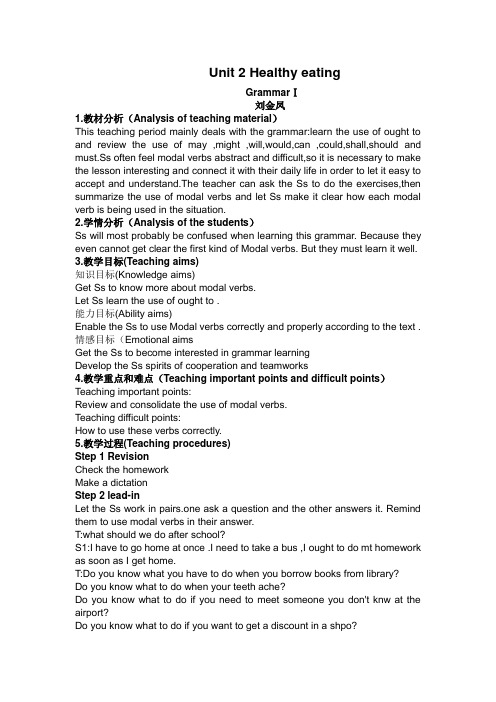
Unit 2 Healthy eatingGrammarⅠ刘金凤1.教材分析(Analysis of teaching material)This teaching period mainly deals with the grammar:learn the use of ought to and review the use of may ,might ,will,would,can ,could,shall,should and must.Ss often feel modal verbs abstract and difficult,so it is necessary to make the lesson interesting and connect it with their daily life in order to let it easy to accept and understand.The teacher can ask the Ss to do the exercises,then summarize the use of modal verbs and let Ss make it clear how each modal verb is being used in the situation.2.学情分析(Analysis of the students)Ss will most probably be confused when learning this grammar. Because they even cannot get clear the first kind of Modal verbs. But they must learn it well.3.教学目标(Teaching aims)知识目标(Knowledge aims)Get Ss to know more about modal verbs.Let Ss learn the use of ought to .能力目标(Ability aims)Enable the Ss to use Modal verbs correctly and properly according to the text . 情感目标(Emotional aimsGet the Ss to become interested in grammar learningDevelop the Ss spirits of cooperation and teamworks4.教学重点和难点(Teaching important points and difficult points)Teaching important points:Review and consolidate the use of modal verbs.Teaching difficult points:How to use these verbs correctly.5.教学过程(Teaching procedures)Step 1 RevisionCheck the homeworkMake a dictationStep 2 lead-inLet the Ss work in pairs.one ask a question and the other answers it. Remind them to use modal verbs in their answer.T:what should we do after school?S1:I have to go home at once .I need to take a bus ,I ought to do mt homework as soon as I get home.T:Do you know what you have to do when you borrow books from library?Do you know what to do when your teeth ache?Do you know what to do if you need to meet someone you don't knw at the airport?Do you know what to do if you want to get a discount in a shpo?Do you know what to do if you meet the hostess in your friend's home ?Step 3 Grammar learnYou ought to have seen that movie. 你早就应该去看那不电影去了。
高一英语《Unit2 Reading》教学设计12
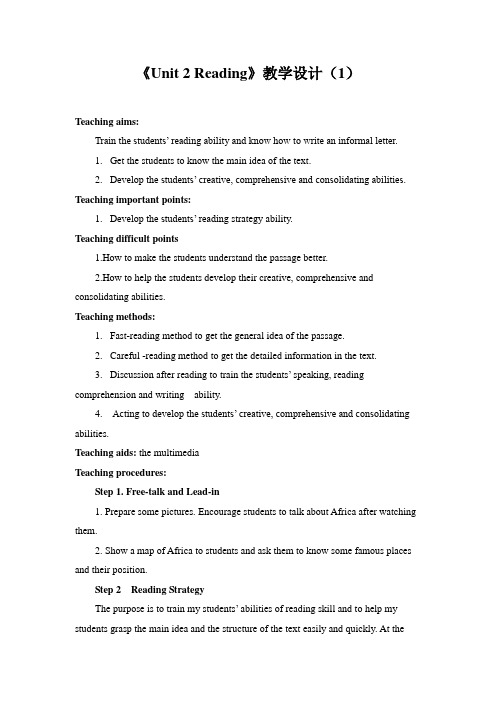
《Unit 2 Reading》教学设计(1)Teaching aims:Train the students’ reading ability and know how to write an informal letter.1. Get the students to know the main idea of the text.2. Develop the students’ creative, comprehensive and consolidating abilities. Teaching important points:1. Develop the students’ reading strategy ability.Teaching difficult points1.How to make the students understand the passage better.2.How to help the students develop their creative, comprehensive and consolidating abilities.Teaching methods:1. Fast-reading method to get the general idea of the passage.2. Careful -reading method to get the detailed information in the text.3. Discussion after reading to train the students’ speaking, reading comprehension and writing ability.4. Acting to develop the students’ creative, comprehensive and consolidating abilities.Teaching aids: the multimediaTeaching procedures:Step 1. Free-talk and Lead-in1. Prepare some pictures. Encourage students to talk about Africa after watching them.2. Show a map of Africa to students and ask them to know some famous places and their position.Step 2 Reading StrategyThe purpose is to train my students’ abilities of reading skill and to help my students grasp the main idea and the structure of the text easily and quickly. At thesame time ,it’s very important to train their reading comprehension ability to fit in their examinations.First of all, read the title and predict what the text mainly talks about.Grasp the key words: adventure, Africa.Secondly, enjoy the pictures.What are they doing? Rafting----dangerous and exciting -------adventure.Thirdly, look through the first paragraph and the first sentences of each paragraph to make the prediction more specific. Because the first paragraph and first sentences of each paragraph usually tells what the text will be about.And look for key words: planning my holiday, trip, travelling ,visit, go to Africa. These words may help to prepare for and predict what will come next.Fourthly, pay attention to the style of an informal letter .For example, the greetings and closings, in order to learn to write a letter by themselves.Finally, refer to the exercises, because they will help understand the structure or clue or the details of the text .such as,Exercise C2-------learn about the routeExercise E--------- learn about the summary of the text.In all, I spend much time to explain the reading strategy ,because I think it’s so important for my students .Step3. Fast readingThe purpose is to find the structure and clue.This time, ask my students to use the reading strategy to read the text fast. Pay attention to:The first paragraph.The first sentences of each paragraph.The key words.At the same time, ask my students to refer to exercise C2.to learn/know about the route and what to do.Try to put the activities in the correct order:___3_______ travel down the River Nile___2______travel on camels through the Sahara Desert___5_______climb Mount Kilimanjaro in Tanzania___4_______see wild animals in Kenya___1_______fly to Morocco___6______ go to the HimalayasStep4 . Difficult words and sentences.When students read. passages, very often they meet words they don’t know .so it’s difficult for them to go on . The teachers should help them understand, Explaining the words in English is a very useful way. So I ask my students to do ExerciseD. to understand these words well.1.Adventure: a having something as part of a group or a set2.Local: b having large and dangerous waves3.Torch c amazing4.Helmet: d not comfortable5.Rafting: e frighten6.Astonishing: f things such as food,medicines,etc.that are needed bya group of people7.Uncomfortable g an exciting experience in which dangerous or unusual things happen8.Rough: h a small electric lamp that you carry in your hand9.Including: I travelling by raft or carrying things by raft10.Supplies: j connected with a particular place of area, especially the place you live in11.Scare: k a strong hard hat worn for protectionKey:1-g , 2-j, 3-h, 4-k, 5-I, 6-c, 7-d, 8-b, 9-a, 10-f, 11-eStep5. Carefully readingScan the whole text to find the route of the adventure.1、First finish Exercise C1,choose the best answer2、Then complete the following form aboutRoute,How to travel.What to take.Why to take.(注:此表根据高考填空题而设计)Key:Route①What to take②On camels③a sleeping bag④Down the river⑤In Kenya⑥walking⑦a backpack⑧water⑨in Tanzania(10)Step6 ConsolidationAfter my students learn about the structure and details, I want them to do exercise Part E.Because it’s the summary of the whole text.Step7. Retell the text .After they learn about the text in detail. I let my students retell the text to check if they can say something about the text by using their own words.They can refer to the main idea, the route of the adventure and the form of the text.Step8 DiscussionI want my students to put what they learn to practice. I want to train their ability of speaking, reading comprehension and writing. At the same time, I want to check if they have understood the whole text very well. So I give them a few minutes to discuss and then act it out in the front. I give them advice to help them do it easier.They just say something about what the text talks about. Refer to part C2 , prate and the form.If you are a guide, what would you introduce to your tourists about?1、the Sahara Desert2、the River Nile3、Kenya.Step9 HomeworkYou are supposed to write a letter to Toby telling him your plan for the oversea travel. Pay attention to the style of the letter.。
高一英语教案:上册Period 2 Reading

高一英语上册Period 2 ReadingTeaching aim:a) Ss will be able to know the development of English and feel the role that culture plays in the change of language.b) Comprehend the whole passagec) Ss will be able to know how to get the key sentence of a paragraph.Teaching procedures:Step 1 lead inAsk students several questions in the form of brain storming.1.Do you know the countries where people speak English? List them on a piece of paper.2.What are the two main groups of English?3.Do you know the differences between British English and American English?4.Do you know the history of English?Step 2 fast readingEnglish is not only different from country to country, but also different from what it was before. Read the title “the road to modern English” and predict (预测) what the passage is mainly about?T: Scan the text to find or make out a key sentence for each paragraph.Let the students find out key sentence of each paragraph or ask them to summarize the main point for eachT: Let’s enjoy the whole passage paragraph by paragraph again. Pay special attention to the following Qs: How did old English develop into modern English?Why does English change all the way?What other Englishes developed from the old English?(1). Give the three major periods of the development of English.the end of the 16th century-------- the next century ------------ todayWho promoted the spread of English?People. When they moved, they carried English to different places.(2) T: Although they speak English, yet sometimes they can not understand each other well, why?--------- Because there exist differences between different Englishes, not only in vocabulary, but also in pronunciation and spelling. (hot/mum/honour/ honor/neighbour/neighor…..)(3) T: How do these differences come about? (Why does English change over time?)--------- Because of cultural communication.Ask ss to find out the characteristics of each time according to the time axis.AD450-1150: German1150-1500: less like German; more like FrenchIn the 1600’s: Shakespeare’s EnglishThe time ADEL was written: American EnglishLater: Australian English(4) T: Besides the countries where English is used as a native language, where else is English used as aforeign language?---------- South Asia, India, South Africa, Singapore, Malaysia and China.Activity 2. Answer the following questions(1)What is the clue of the passage?(2) Why does India have a very number of English speakers?(3) When did people from England begin to move to other parts of the world?Activity 3: Choose the correct answers.Step 4 Post-ReadingT: From the passage we can see English is widely accepted as a native, second or third language. No wonder the number of people learning English in China is increasing rapidly. Will Chinese English become one of the world Englishes? ---------- “ Only time will tell”.T: How do you understand this sentence?---------- It means that something can only be known in the future.T: What can you infer from this sentence about the development of English in China?--------- It indicates that it remains to be seen just how much the Chinese culture will influence the English language in the present country.Step 5. Language focus:1)even if=even though: in spite of the fact; no matter whether: He likes to help us even if heis very busy.2)communicate with: exchange information or conversation with other people: He learnt touse body language to communicate with deaf customers.3)actually=in fact: used when you are adding new information to what you have just said:We’ve known for years. Actually, since we were babies.4)be based on…:5)make use of: use sth. available6)Only time will tell: to say that something can only be known in the future: Will China’snational football team enter for the next finals of the World Cup? Only time will tell. Step 6 DiscussionWork in groups. Discuss the question and then ask two groups to report their answers to the class.1.Why do you think people all over the world want to learn English?Step 7 Homework1. Read the passage as fluently as you can.2. Find out some words and sentences you think are beautiful and recite them.3. p11.ex2.3.4。
人教版高中英语必修3衢州市仲尼中学Period 2 ReadingⅠ教案

Unit 1 Festivals around the worldPeriod 2 ReadingⅠ1.教材分析(analysis of teaching material)Reading is a key part of the unit. The reading passage titled FESTIVALS AROUND THE WORLD briefly describes the earliest kinds of festivals with the reasons for them, and then four different kinds of festivals that occur in most parts of the world.2.学情分析(analysis of the students)After warming up, Ss may have a general impression of the festivals. The passage is told as an introduction which is not difficult to understand. And the teacher will deal with any language problems while Ss are reading.3.教学目标(Teaching aims)知识目标(Knowledge aims)a. Words and expressions:Beauty harvest celebration starve origin religious ancestor Mexico feast bone belief trick poet arrival gain independence gather agriculture award rooster admire energetic Easter clothing Christian custom worldwideb. Sentences:They lit fires and made music because they thought these festivals would bring a year of plenty. P1They might include parades, dancing in the streets day and night, loud music and colorful clothing of all kinds. P2Some festivals are held to honor the dead, or satisfy and please the ancestor, who could return either to help or to do harm. P2On this important feast day, people might eat food in the shape of skulls, and cakes with "bones" on them. P2Another is Columbus Day in the USA, in memory of the arrival of Christopher Columbus in America. P2能力目标(Ability aims)To enable the students to know the earliest festivals with reasons for them and four different kinds of festivals that occur in most parts of the world.Enable the students to master some English expressions and phrases about festivals. 情感目标(Emotional aims)Get the Ss to learn more information about festivals around the worldGet the Ss to develop their ethnical emotion.4.教学重点和难点(teaching important points and difficult points)#Teaching important points:Talk about all kinds of festivals.Improve the Ss’ reading ability#Teaching difficult points:How to express their own opinions and ideasHow to grasp the main idea of the text5.教学过程(Teaching procedures)Step I Revision1. Greetings.2. Review the new words of this part.3. Check the students’ homework---festivals.Step 2 Pre-reading1. What festivals or celebrations do you have in your city or town? What part of a festival do you like best- the activities, the music, the sights, the food or the people who visit?2. PredictionLook at the pictures and title of the passage below. What kind of information you think will be introduced in the passage.Step3 Learn the new words in the text:starve: 饥饿 origin: 起源 ancestor: 祖先 Obon: 盂兰盆节(日本)grave: 坟墓;墓地 incense: 熏香 in memory of: 纪念 feast: 节日;盛宴skull: 头骨 dress up: 打扮;盛装 play a trick on: 搞恶作剧 award: 奖品rooster: 公鸡 energetic: 充满活力的 carnival: 狂欢节 parade: 游行Step4 SkimmingWhat festivals are mentioned in each paragraph?P1.celebrate the end of the cold weather, planting in spring and harvest in autumn; celebrate when hunters catch animals.P 2. Festivals of the DeadJapan -----ObonMexico------Day of the DeadAmerica------HalloweenP 3. Festivals to Honour PeopleDragon Boat FestivalColumbus Day(India)October 2P 4. Harvest FestivalsHarvest and Thanksgiving FestivalMid-Autumn festivalP 5.Spring festivalCarnivalEasterCheery Blossom FestivalStep5 Detailed readingPara11.When did ancient people celebrate?the end of cold weather, planting in spring,harvest in autumn;when hunter caught animals for food;when they had enough food;when they wanted a year of plenty2. Why music and fires are used in festivals?Because they thought these festivals would bringa year of plenty.Para21. What are festivals of the dead for?to honor our ancestors;to make our ancest or happy so don’t harm us;2. What do people do in Japan during Obon?People should go to clean the graves and light incense in memory of their ancestor.They also light lamps and play music.3. What do Mexico people eat?Eat food in shap e of skulls and cakes with “bones”on them.4. What can you see in the second picture?Which festival does it belong to?a pumpkin lantern;HalloweenPara31. Which festivals or celebration do you knowhonor famous people or important thing?Dragon Boat Festival; Columbus Day;an international festival in Indian on October 2.2. Why does Indian have a national festivalon October 2?To honor Ganhdi who helped gain Indian’sindependence from Britain.Para41. Why are autumn festivals happy events?People are grateful for the harvest;for the end of the agriculture work.2. How European celebrate this festival?decorate churches and town halls with flowerand fruits; people get together to have meals.Para51. Which festivals are happened in spring?Spring Festival;Carnival; Easter; Cherry Blossom2. Name three things people do at Spring Festival.people eat dumpling, fish, meat;give children lucky money; dragon dances;visit family members3. What kind of festival Easter is?an important religious and social festivalin Christian countries.4. What does Japan look like when it is CherryBlossom Festival?It looks as though it might be covered with pink snow.Step 6 True or False1. The ancient people needn’t worry about their food.2. Halloween used to be a festival intended to honor the dead.3. Qu Yuan was a great poet who people honor a lot in China.4. Mid-autumn Festival is held to celebrate the end of autumn.5. Easter celebrates the birth of Jesus.FTTFF板书设计:问题研讨(Problem study):课堂提问1. What’s the main idea of the passage?2. What’s the topic sentence of each para.?3. How did the white people stop the black people from being treated fairly?4. Why did Elias support Mandela?5. Why did he support violence when he did not agree with it?作业完成句子(A level)⑴根据中文意思完成句子1. _________ _________your company is large, it can still _________ _________ trouble by growing too quickly.即使你们公司很庞大,如果发展太快也会陷入困境的。
浙江省衢州市仲尼中学高一英语人教版 using language 教案
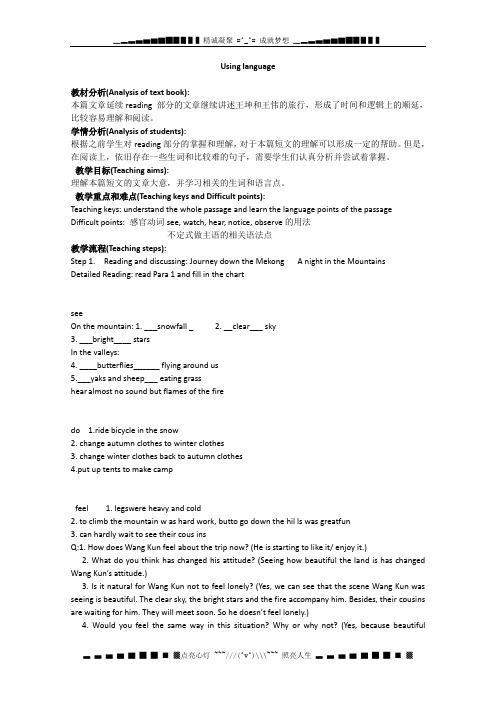
Using language教材分析(Analysis of text book):本篇文章延续reading 部分的文章继续讲述王坤和王伟的旅行,形成了时间和逻辑上的顺延,比较容易理解和阅读。
学情分析(Analysis of students):根据之前学生对reading部分的掌握和理解,对于本篇短文的理解可以形成一定的帮助。
但是,在阅读上,依旧存在一些生词和比较难的句子,需要学生们认真分析并尝试着掌握。
教学目标(Teaching aims):理解本篇短文的文章大意,并学习相关的生词和语言点。
教学重点和难点(Teaching keys and Difficult points):Teaching keys: understand the whole passage and learn the language points of the passage Difficult points: 感官动词see, watch, hear, notice, observe的用法不定式做主语的相关语法点教学流程(Teaching steps):Step 1. Reading and discussing: Journey down the Mekong A night in the MountainsDetailed Reading: read Para 1 and fill in the chartseeOn the mountain: 1. ___snowfall _ 2. __clear___ sky3. ___bright____ starsIn the valleys:4. ____butterflies______ flying around us5.___yaks and sheep___ eating grasshear almost no sound but flames of the firedo 1.ride bicycle in the snow2. change autumn clothes to winter clothes3. change winter clothes back to autumn clothes4.put up tents to make campfeel 1. legswere heavy and cold2. to climb the mountain w as hard work, butto go down the hil ls was greatfun3. can hardly wait to see their cous insQ:1. How does Wang Kun feel about the trip now? (He is starting to like it/ enjoy it.)2. What do you think has changed his attitude? (Seeing how beautiful the land is has changed Wang Kun’s attitude.)3. Is it natural for Wang Kun not to feel lonely? (Yes, we can see that the scene Wang Kun was seeing is beautiful. The clear sky, the bright stars and the fire accompany him. Besides, their cousins are waiting for him. They will meet soon. So he doesn’t feel lonely.)4. Would you feel the same way in this situation? Why or why not? (Yes, because beautifulscenery will make people happy when his best friend are waiting for him somewhere.)5. Do Chinese like to be around others more than westerners? (Yes, Chinese prefer to be around others while westerners want to spend some time alone. This is because of different cultures.)6. What items are Wang Kun and Wang Wei carrying with them? What do you think they will have to leave behind in Dali? What should they take instead? (They are carrying a tent, a cooker and food, pillows, water bottles. In the mountains they wore long wool coats, caps, gloves and trousers. In the plains they changed into T-shirts and shorts.)Language points:1.Have you ever seen snowmen ride bicycle?感动动词see, watch, hear, notice, observe+ sb. doing sth. 动词正在进行+ sb. do sth. 动作全过程+ sth. done 看见被动/ 完成的动作I saw her __going____ (go) into the school when I passed the school gate.They knew her very well. They had seen her __grow_ (grow) up from childhood.He could do nothing but see his house _burnt__ (burn) down.2.as usual 如平时As usual, he is the first to come to the classroom.The meeting was, as usual, boring.3.She is very _reliable___ and I knew I didn’t need to encourage her.reliable adj. 可信赖的,可依靠的(dependable)eg. In order to make friends with others, you must be reliable/ dependable.4.To climb the mountain road was hard work but as we looked around, we were surprised bythe view.1)不定式作主语,谓语动词用单数,可以用形式主语it.It is + adj./ n. (for sb.) to do sth.eg. To learn a foreign language is important for your future work.= It is important for your future work to learn a foreign language.To finish this job in one day is not possible.= It is not possible to finish this job in oneday.Is it necessary to complete the design before National Day?2)view n. 自然美景,风景从某处看到的东西eg. You’ll get a better view of the pianist if you stand up.5.Fun n. 乐事,有趣的事(不可数)Have fun=enjoy yourselfIt is much/ great fun to do sth. 做……很有趣It is much/ great fun to swim in hot days.What __C_____ fun it is to have a swim on a hot day in summer!A. aB. theC. /D. of6.We had to change our caps, coats, gloves and trousers for T-shirts and shorts.change 换衣,更换如:Wait, it won’t take me long to change.get changed 换好衣服change 可作名词“零钱”讲change A for B 用A换B高考链接:Sara, hurry up. I’m afraid you won’t have time to ___A_______ before the party.A.get changedB. get changeB. C. get changing D. get to change7.In the early evening, we always stop to make camp.1)stop to do sth. 停下手头上的事,去做别的事stop doing sth. 停止正在做的事The students stopped _talking__ (talk) as the teacher came into the classroom.It is already 12 o’clock. Let’s stop _to have__ (have) a rest.2)camp n. 野营,营地,营帐make camp 去露营,去野营At weekends many Australians go walking or camping in the countryside, called the bush.8.We put up our tents and then we ate.put up 举起,抬起(=raise)/挂起,张贴/建造,搭起(=build)/ 住宿,留宿eg: He put up his hand to catch the teacher’s attention.A new notice has been put up on the board.A new theatre will be put up where there used to be a temple.Will you put me up for the night?补充:put away 把……收起来,存放put back 放回原处put down 放下,写下,镇压put forward 提出put off 推迟,拖延put out 扑灭,伸出put one’s heart to 全神贯注于put an end to 使结束9.As I lay beneath the stars I thought about how far we had already travelled.beneath prep.1)(位置、场所)在……之下2)不足取;不适合3)(地位、价值)较……为差We are studying beneath the same roof.She looks down upon those people beneath her. 她瞧不起那些地位比她低的人。
浙江省衢州市仲尼中学高一英语《Unit 2 Using language----language points》教案
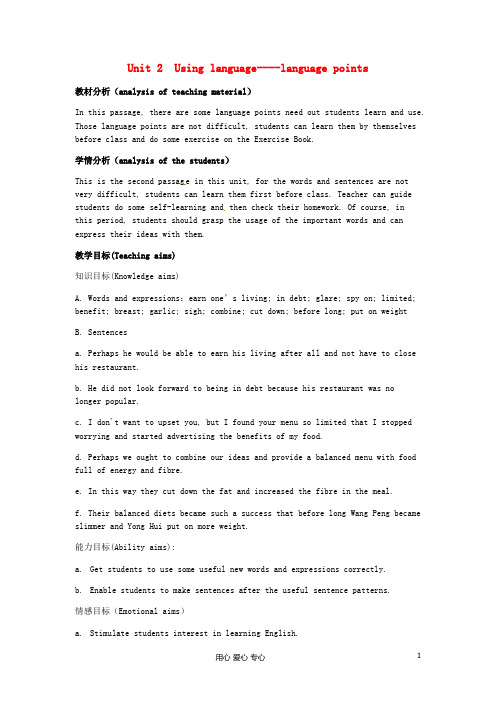
Unit 2 Using language----language points教材分析(analysis of teaching material)In this passage, there are some language points need out students learn and use. Those language points are not difficult, students can learn them by themselves before class and do some exercise on the Exercise Book.学情分析(analysis of the students)This is the second passag e in this unit, for the words and sentences are not very difficult, students can learn them first before class. Teacher can guide students do some self-learning and then check their homework. Of course, inthis period, students should grasp the usage of the important words and can express their ideas with them.教学目标(Teaching aims)知识目标(Knowledge aims)A. Words and expressions:earn one’s living; in debt; glare; spy on; limited; benefit; breast; garlic; sigh; combine; cut down; before long; put on weightB. Sentencesa. Perhaps he would be able to earn his living after all and not have to close his restaurant.b. He did not look forward to being in debt because his restaurant was nolonger popular.c. I don't want to upset you, but I found your menu so limited that I stopped worrying and started advertising the benefits of my food.d. Perhaps we ought to combine our ideas and provide a balanced menu with food full of energy and fibre.e. In this way they cut down the fat and increased the fibre in the meal.f. Their balanced diets became such a success that before long Wang Peng became slimmer and Yong Hui put on more weight.能力目标(Ability aims):a.Get students to use some useful new words and expressions correctly.b.Enable students to make sentences after the useful sentence patterns.情感目标(Emotional aims)a.Stimulate students interest in learning English.b.Let students can express their ideas about the balanced diets with newwords and expressions.c.Develop students’ spirit cooperation and teamwork.4.教学重点和难点(teaching important po ints and difficult points)#Teaching important points:1.Enable students to grasp the usages of such important new words andexpressions as diet, balance, consult, limit, benefit, combine, before long etc.2.Get students to master the sentences that we learn in this period.#Teaching difficult points:1.Let students learn the usage of the new words and expressions.2.Get students to understand some difficult and long sentences.教学过程(Teaching procedures)Step 1 Lead-in1.Check the homework.2.Read the new words and expressions of this passage: earn one’s living; indebt; glare; spy on; limited; benefit; breast; garlic; sigh; combine; cut down; before long; put on weightStep 2 language points1.…she did not con sult a doctor…consult vi & vt 商议,商量,请教,咨询,找(医生)诊治They consulted long, but could not decide.拓展: consult a doctor about one’s illness 找医生治病consult reference books 翻阅参考书consult the dictionary 查字典consult the telephone directory 查看电话薄2.Perhaps he would be able to earn his living after all and not have to closehis restaurant.earn 1) vt & vi 赚得,挣钱 earn money 赚钱2) vt 获得,博得,使得到,使获得,使值得If you grant my request, you will earn my thanks.3) earn one’s a living = make a living 谋生,以……为生As long as you work hard, it is not difficult to earn your living.拓展: make a (one’s) living 谋生 earn an income 挣得收入earn one’s bread 谋生,维持生计earn one’s praise 赢得赞扬3.He did not look forward to being in debt because his restaurant was nolonger popular.debt n. 债务,欠债,负债状况be in debt 欠债,负债反义词; out of debt 还清债务be in debt to sb. (= be in sb’s debt) 欠某人的情,欠债pay off the debts 还清债务eg: The man is in heavy debt/ in debt/ heavily in debt.4.I don't want to upset you, but I found your menu so limited that I stoppedworrying and started advertising the benefits of my food.1)limited adj. 有限的 My vocabulary is quite limited.limit n. 界限;限度 There is a limit to the amount of pain we canbear.vt 限制,限定( limit…into…)We must limit our expenses.2)benefit n. 利益,益处,帮助;具体的好处The cooperation will bring some benefits.vt. & vi 有益于;有助于,受益(常与from, by 连用)The fresh air will benefit you.We benefit from/ by his help.拓展: be of benefit to …对……有益for the benefit of= for sb’s benefit 对某人的利益be beneficial to 对……有益benefit from/ by 有益于5.Perhaps we ought to combine our ideas and provide a balanced menu with foodfull of energy and fibre.combine vt & vi (使)联合;(使)结合combine… and/ with…使……和……结合在一起be combined with 与……结合eg: Oil and water don’t combine.Some films combine education with entertainment.6.In this way they cut down the fat and increased the fibre in the meal.cut down 砍到,减少,删减,删节The apple tree was dead and he cut it down.cut out 删(省)掉,戒掉cut off 中止;关掉cut in 插嘴;突然插入cut… short…将……缩短;截短cut up 切碎cut away 切掉;砍掉;逃走7.Their balanced diets became such a success that before long Wang Peng…before long 不久以后Just have a little more patience, and the operation will be finished beforelong.拓展: 1) It will be/ is long before + 从句(一般现在时)“过了很久才……”2) It was long before+ 从句(一般过去时,过去将来时)“过了很久才……”3) It will not be long before + 从句(一般现在时)与 It was not longbefore + 从句(一般过去时或过去将来时)“不久就……”辨析: before long ; long beforell know before long.板书设计问题研讨(Problem study):课堂提问:1.What the main idea of Come and Eat Here (2)?2.How about the ending of this story and how do you think of it?练习:1.翻译:1)我要请教一下我的老师才能做出决定。
浙江省衢州市仲尼中学高一英语人教版《音标》复习教案:Period 1 音标

高一英语教案(Period1--5)Period1 音标(Phonetic Symbols)知识的系统复习高一英语备课组教材分析:音标是学好英语口语和听力的前提。
我们的学生有一部分都是初学音标,一般来说初学者要先积累标准发音的英语单词,句子,然后再学习音标。
一个单词都没有听过标准发音时,靠音标来拼读是不会准确的。
结合正确发音的单词来学习音标是掌握正确音标发音的捷径。
于在音标教学时我们挑选了一些相应的单词,便于学生掌握。
学情分析:我们学校的高一学生很多都没有经过系统的音标学习的,音标的教学在很多初中学校都没有得到足够的重视,因此学生的掌握程度参差不齐,且发音的方式五花八门。
在这样的情况下,高一开学之初就极为必要进行系统的英标复习了。
教学目标:1.让学生知道汉语和英语虽然是两种不同的语言,语音表现形式的作用却是对等的2.让学生学会认读48个音标及发音特征3.让学生知道长元音和短元音的区别,了解爆破音、清辅音、浊辅音的概念教学重点:1.国际英标体系的概念2.48个音标的认读与准确的发音教学难点:认识48个音标的特点及发音位置教学流程:Warming up:Greeting英语音标发音表48个英语国际音标发音规则“英语里一共有48个音素,其中20个是元音,28个是辅音。
元音又可分为单元音(12个)和双元音(8个)。
先讲解12个单元音,这12个单元音又可以分为:一、前元音[i:][i][e][æ]所谓前元音是指发音时要使用舌前部,也就是说舌前部要向硬腭抬起,舌尖要抵住下齿,口形扁平,不要收圆。
四个前元音中发[i:]的时候舌前部抬得最高,牙床近乎全合。
发[i]的时候舌前部比[i:]稍低,牙床也开得稍大一些。
上下齿之间的距离大约可以容纳一个小指尖。
发第三个前元音[e]的时候舌前部比[i]又要第一些,牙床也开得更大一些。
上下齿之间的距离大约相当于一个食指尖。
发第四个前元音[?]的时候舌前部最低,牙床开得最大。
浙江省衢州市仲尼中学高一英语《Unit 2 healthy eating》教案

Unit 2 healthy eating1.教材分析The emphasis of this period will be placed on reviewing the important new words, expressions and sentence patterns in the parts Warming up, Pre-reading, Reading and Comprehending. In order to make students grasp and use these important points thoroughly.2. 学情分析Our Ss don’t like even hate to memorize words and language points; however they are the fundamental of learning English. This class will help them to memorize language points by exercises.3. 教学目标1.知识目标1). Get Ss to go over the useful new words and expressions in this unit.2). Have Ss review the new grammar item: modal verbs2.能力目标1). Develop Ss’ ability to use the important language points in this unit.2). Enable Ss to learn to use modal verbs3. 情感目标1)Stimulate students' sense to form a revision habit2) Develop students' sense of cooperative learning4.教学重点1.Get Ss to review and consolidate what they have learned in this unit.2.Develop Ss’ ability to solve problems.5.教学难点1. Get Ss to turn what they have learned into their ability.6.教学过程Step 1 Revision1.Check the homework exercis es.2.Dictate some useful new words and expressions in this unit.Step 2 考点串串讲重点单词1.balance vt.平衡;权衡●用法拓展balance n.天平;平衡。
浙江省衢州市仲尼中学高一英语人教版 Review Important language points 教案
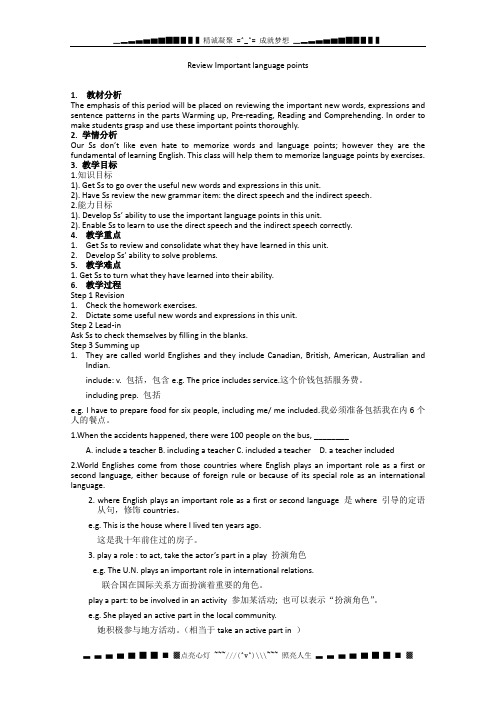
Review Important language points1.教材分析The emphasis of this period will be placed on reviewing the important new words, expressions and sentence patterns in the parts Warming up, Pre-reading, Reading and Comprehending. In order to make students grasp and use these important points thoroughly.2. 学情分析Our Ss don’t like even hate to memorize words and language points; however they are the fundamental of learning English. This class will help them to memorize language points by exercises.3. 教学目标1.知识目标1). Get Ss to go over the useful new words and expressions in this unit.2). Have Ss review the new grammar item: the direct speech and the indirect speech.2.能力目标1). Develop Ss’ ability to use the important language points in this unit.2). Enable Ss to learn to use the direct speech and the indirect speech correctly.4.教学重点1.Get Ss to review and consolidate what they have learned in this unit.2.Develop Ss’ ability to solve problems.5.教学难点1. Get Ss to turn what they have learned into their ability.6.教学过程Step 1 Revision1.Check the homework exercises.2.Dictate some useful new words and expressions in this unit.Step 2 Lead-inAsk Ss to check themselves by filling in the blanks.Step 3 Summing up1.They are called world Englishes and they include Canadian, British, American, Australian andIndian.include: v. 包括,包含e.g. The price includes service.这个价钱包括服务费。
浙江省衢州市仲尼中学高一英语教案《Unit2Workingtheland》
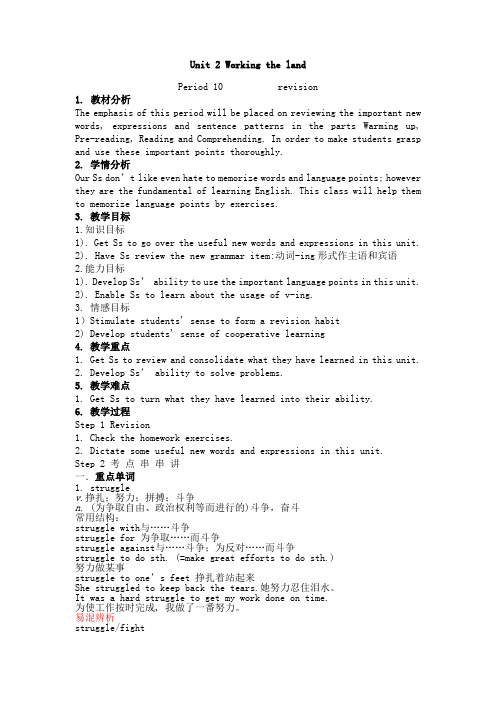
Unit 2 Working the landPeriod 10 revision1.教材分析The emphasis of this period will be placed on reviewing the important new words, expressions and sentence patterns in the parts Warming up, Pre-reading, Reading and Comprehending. In order to make students grasp and use these important points thoroughly.2. 学情分析Our Ss don’t like even hate to memorize words and language points; however they are the fundamental of learning English. This class will help them to memorize language points by exercises.3. 教学目标1.知识目标1). Get Ss to go over the useful new words and expressions in this unit.2). Have Ss review the new grammar item:动词-ing形式作主语和宾语2.能力目标1). Develop Ss’ ability to use the important language points in this unit.2). Enable Ss to learn about the usage of v-ing.3. 情感目标1)Stimulate students' sense to form a revision habit2) Develop students' sense of cooperative learning4.教学重点1.Get Ss to review and consolidate what they have learned in this unit.2.Develop Ss’ ability to solve problems.5.教学难点1. Get Ss to turn what they have learned into their ability.6.教学过程Step 1 Revision1.Check the homework exercises.2.Dictate some useful new words and expressions in this unit.Step 2 考点串串讲一.重点单词1. strugglev.挣扎;努力;拼搏;斗争n. (为争取自由、政治权利等而进行的)斗争,奋斗常用结构:struggle with与……斗争struggle for 为争取……而斗争struggle against与……斗争;为反对……而斗争struggle to do sth. (=make great efforts to do sth.)努力做某事struggle to one’s feet 挣扎着站起来She struggled to keep back the tears.她努力忍住泪水。
高一英语《Unit2 Reading》教学设计1

《Unit 2 Reading》教学设计(1)Teaching objectives:1. To develop students’ ability of reading a play2. To know about American family life and problems that happen between American teenagers and their parents3. To form a positive attitude towards solving problems between teenagers and parentsImportant and difficult points:Learn to analyze the emotions of each character from the instructions of the play.Teaching procedures:Step 1 Lead-in:Get students to think about the following questions:Have you ever been left alone? Describe that experience.If not, can you imagine what might happen if you were left alone? Can you look after your home and keep everything clean and safe?Step 2 Reading StrategyPlease go through the Reading strategy and tell me how to read a play.(make sure students know how to read a play.)Some points about a play:1. It is often in the form of _________.2. It usually includes___________, and each act can have_____________.3. The words or speeches in a play are very________, and some of the words in a sentence are_______________.4. There are some helpful_____________ in a play.5. It should be_________________.Step 3 First reading:Get students to read the play and finish Part A individually.Step 4 Second readingT/F1. Mom and Dad were back from their holiday a week earlier.2. Eric was happy when seeing his mother.3. Parents left Daniel in charge.4. The boys spent the money seeing the vet for Spot.5. The room was very clean and tidy when their parents came back.6. Daniel didn’t have a chance to explain what had happened.7. Mom felt regretful for what they said to Daniel.8. Boys didn’t use up the money from their parents.Step5 Third reading1. Please read Act One of the play carefully and fill in the form.2. Please read Act Two carefully and fill in form:Step 6: Analyze1. Why does Eric sound frightened when he sees his parent back?2. How does Mom know that the dog is tired and hungry?3. What does Dad mean by saying “This is not a family where bad behavior goes unpunished…”?Step7: Role-playDivide students into groups of five and one is the narrator and the others are the main characters. Role-play Act One and Act Two.Step8: Discussion1. Suppose you were one of the children what would you do?2. How do you think good parents should treat their children?3. Do you think there is a generation gap between you and your family? How can you deal with it?Homework:1 Write an end to the play.2 Role-play the dialogue in groups of five.。
- 1、下载文档前请自行甄别文档内容的完整性,平台不提供额外的编辑、内容补充、找答案等附加服务。
- 2、"仅部分预览"的文档,不可在线预览部分如存在完整性等问题,可反馈申请退款(可完整预览的文档不适用该条件!)。
- 3、如文档侵犯您的权益,请联系客服反馈,我们会尽快为您处理(人工客服工作时间:9:00-18:30)。
Unit 1 Festivals around the worldPeriod 2 ReadingⅠ李菲1.教材分析(analysis of teaching material)Reading is a key part of the unit. The reading passage titled FESTIVALS AROUND THE WORLD briefly describes the earliest kinds of festivals with the reasons for them, and then four different kinds of festivals that occur in most parts of the world.2.学情分析(analysis of the students)After warming up, Ss may have a general impression of the festivals. The passage is told as an introduction which is not difficult to understand. And the teacher will deal with any language problems while Ss are reading.3.教学目标(Teaching aims)知识目标(Knowledge aims)a. Words and expressions:Beauty harvest celebration starve origin religious ancestor Mexico feast bone belief trick poet arrival gain independence gather agriculture award rooster admire energetic Easter clothing Christian custom worldwideb. Sentences:They lit fires and made music because they thought these festivals would bring a year of plenty. P1They might include parades, dancing in the streets day and night, loud music and colorful clothing of all kinds. P2Some festivals are held to honor the dead, or satisfy and please the ancestor, who could return either to help or to do harm. P2On this important feast day, people might eat food in the shape of skulls, and cakes with "bones" on them. P2Another is Columbus Day in the USA, in memory of the arrival of Christopher Columbus in America. P2能力目标(Ability aims)To enable the students to know the earliest festivals with reasons for them and four different kinds of festivals that occur in most parts of the world.Enable the students to master some English expressions and phrases about festivals.情感目标(Emotional aims)Get the Ss to learn more information about festivals around the worldGet the Ss to develop their ethnical emotion.4.教学重点和难点(teaching important points and difficult points)#Teaching important points:Talk about all kinds of festivals.Improve the Ss’ reading ability#Teaching difficult points:How to express their own opinions and ideasHow to grasp the main idea of the text5.教学过程(Teaching procedures)Step I Revision1. Greetings.2. Review the new words of this part.3. Check the students’ homework---festivals.Step 2 Pre-reading1. What festivals or celebrations do you have in your city or town? What part ofa festival do you like best- the activities, the music, the sights, the food or the people who visit?2. PredictionLook at the pictures and title of the passage below. What kind of information you think will be introduced in the passage.Step3 Learn the new words in the text:starve: 饥饿origin: 起源ancestor: 祖先Obon: 盂兰盆节(日本) grave: 坟墓;墓地incense: 熏香in memory of: 纪念feast: 节日;盛宴skull: 头骨dress up: 打扮;盛装play a trick on: 搞恶作剧award: 奖品rooster: 公鸡energetic: 充满活力的carnival: 狂欢节parade: 游行Step4 SkimmingWhat festivals are mentioned in each paragraph?P1.celebrate the end of the cold weather, planting in spring and harvest in autumn; celebrate when hunters catch animals.P 2. Festivals of the DeadJapan -----ObonMexico------Day of the DeadAmerica------HalloweenP 3. Festivals to Honour PeopleDragon Boat FestivalColumbus Day(India)October 2P 4. Harvest FestivalsHarvest and Thanksgiving FestivalMid-Autumn festivalP 5.Spring festivalCarnivalEasterCheery Blossom FestivalStep5 Detailed readingPara11.When did ancient people celebrate?the end of cold weather, planting in spring,harvest in autumn;when hunter caught animals for food;when they had enough food;when they wanted a year of plenty2. Why music and fires are used in festivals?Because they thought these festivals would bringa year of plenty.Para21. What are festivals of the dead for?to honor our ancestors;to make our ancestor happy so don’t harm us;2. What do people do in Japan during Obon?People should go to clean the graves and light incense in memory of their ancestor.They also light lamps and play music.3. What do Mexico people eat?Eat food in shape of skulls and cakes with “bones”on them.4. What can you see in the second picture?Which festival does it belong to?a pumpkin lantern;HalloweenPara31. Which festivals or celebration do you knowhonor famous people or important thing?Dragon Boat Festival; Columbus Day;an international festival in Indian on October 2.2. Why does Indian have a national festivalon October 2?To honor Ganhdi who helped gain Indian’sindependence from Britain.Para41. Why are autumn festivals happy events?People are grateful for the harvest;for the end of the agriculture work.2. How European celebrate this festival?decorate churches and town halls with flowerand fruits; people get together to have meals.Para51. Which festivals are happened in spring?Spring Festival;Carnival; Easter; Cherry Blossom2. Name three things people do at Spring Festival.people eat dumpling, fish, meat;give children lucky money; dragon dances;visit family members3. What kind of festival Easter is?an important religious and social festivalin Christian countries.4. What does Japan look like when it is CherryBlossom Festival?It looks as though it might be covered with pink snow. Step 6 True or False1. The ancient people needn’t worry about their food.2. Halloween used to be a festival intended to honor the dead.3. Qu Yuan was a great poet who people honor a lot in China.4. Mid-autumn Festival is held to celebrate the end of autumn.5. Easter celebrates the birth of Jesus.FTTFF问题研讨(Problem study):课堂提问1. What’s the main idea of the passage?2. What’s the topic sentence of each para.?3. How did the white people stop the black people from being treated fairly?4. Why did Elias support Mandela?5. Why did he support violence when he did not agree with it?作业完成句子(A level)⑴根据中文意思完成句子1. _________ _________your company is large, it can still _________ _________ trouble by growing too quickly.即使你们公司很庞大,如果发展太快也会陷入困境的。
